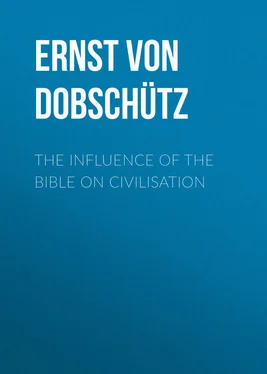Ernst Dobschütz - The Influence of the Bible on Civilisation
Здесь есть возможность читать онлайн «Ernst Dobschütz - The Influence of the Bible on Civilisation» — ознакомительный отрывок электронной книги совершенно бесплатно, а после прочтения отрывка купить полную версию. В некоторых случаях можно слушать аудио, скачать через торрент в формате fb2 и присутствует краткое содержание. Жанр: foreign_religion, foreign_antique, foreign_prose, на английском языке. Описание произведения, (предисловие) а так же отзывы посетителей доступны на портале библиотеки ЛибКат.
- Название:The Influence of the Bible on Civilisation
- Автор:
- Жанр:
- Год:неизвестен
- ISBN:нет данных
- Рейтинг книги:3 / 5. Голосов: 1
-
Избранное:Добавить в избранное
- Отзывы:
-
Ваша оценка:
- 60
- 1
- 2
- 3
- 4
- 5
The Influence of the Bible on Civilisation: краткое содержание, описание и аннотация
Предлагаем к чтению аннотацию, описание, краткое содержание или предисловие (зависит от того, что написал сам автор книги «The Influence of the Bible on Civilisation»). Если вы не нашли необходимую информацию о книге — напишите в комментариях, мы постараемся отыскать её.
The Influence of the Bible on Civilisation — читать онлайн ознакомительный отрывок
Ниже представлен текст книги, разбитый по страницам. Система сохранения места последней прочитанной страницы, позволяет с удобством читать онлайн бесплатно книгу «The Influence of the Bible on Civilisation», без необходимости каждый раз заново искать на чём Вы остановились. Поставьте закладку, и сможете в любой момент перейти на страницу, на которой закончили чтение.
Интервал:
Закладка:
An attempt to copy the letters of St. Paul (Romans counts as A = first letter) giving the text only unto Romans 1: 7; late third or early fourth century.
From Oxyrhynchus Papyri, Vol. II, PI. II, Egypt Exploration Fund – London.
Here begins our difficulty: how did they get so many copies? There was an organised book-trade in the ancient world; publishers had their offices, using (instead of printing-presses) slaves who were trained in copying; they had shorthand writers, as well as calligraphers to do the fine writing. But as long as Christianity was still an oppressed religion it is doubtful if the Bible was among the books which publishers would care to take. The Christians were, most of them, poor people who could not spend much money for procuring Bibles. Besides, it was no easy thing to get a complete Bible. At that time the books were still written on papyrus rolls, not in book form. Only one side of the papyrus could be used; the roll would become unwieldy if too long. So, in order to get all the books of the Old and the New Testament, at least two dozen rolls had to be written. Maybe a simple Christian copied for himself one gospel or some letters or even one or more books from the Old Testament. There are preserved on papyrus some unfinished attempts which show what hard work it was (Plate I). We can scarcely imagine a man going with this heavy hand through all the books of the Bible.
We are told that wealthy Christians helped their brethren by procuring copies for them. Origen, the greatest Bible scholar of the ancient church, is said to have been supported by a rich admirer, who put at his disposal a number of slave copyists. With their help he succeeded in creating one of the greatest works which Bible criticism ever undertook, his so-called Hexapla, which is a comparison of more than six various Greek translations of the Old Testament. Scholars in the nineteenth century held that scarcely more than one copy of this enormous work had ever been written, but by recent discoveries we know that it was copied several times (Plate II). A later admirer of Origen, Pamphilus, is said always to have carried with him several rolls in order to provide poor brethren. Now that was the third century. Christianity had already begun to spread among the higher classes and to become a feature in the world's life.
Fragment found in the Cairo-Genizah and published by E. Taylor in 1900; parchment, fifth century, with part of second, third, and fourth columns: Ps 22: 25-28; used later for copying Hebrew texts.
From "Hexapla of Origen," by E. Taylor, published by G. P. Putnam's Sons.
Devotional reading of the Bible was accompanied by scholarly interpretation. We mentioned Origen as the greatest Bible scholar of his time, if not of all times. It may be worth while to insert here a few words on his life. A native of Alexandria, he saw as a boy his father dying as a martyr for his Christian faith; he longed to become a martyr himself, and was only prevented from giving himself up by a trick of his mother's, who concealed all his clothes. He got a good training at the catechetical school of Alexandria, not restricting himself to mere Christian and Biblical studies, but reading the pagan philosophers of his time as well as the Greek classics. A youth of only eighteen years, he became the head of the school, and his fame spread all over the empire. He travelled to Rome, to Greece; he was even asked by the Roman governor to come to Arabia to settle certain questions. So zealous was he to fulfil the commandments of the gospel that, misunderstanding one of the Lord's sayings, he made himself a eunuch for the kingdom of heaven's sake, which brought him into trouble in his later life. When once on a journey through Palestine he, being still a layman, had preached before the bishop of Cæsarea, he was summoned by his own bishop and ordered not to preach. Some years afterward the bishop of Cæsarea, who was among his strongest admirers, ordained him a priest, which caused his bishop to banish him from Alexandria. He settled at Cæsarea and lived there for twenty years without ever aiming at any ecclesiastical position, pursuing his study of the Bible and gathering around his chair the best men from every part of Christianity. So great was his fame that the empress Julia Mammæa, being still a pagan, asked him to see her when she was travelling in the East. He was the one man to refute the vigorous attack made against the truth of Christian doctrine by the philosopher Celsus. When persecution began again he wrote a tractate of comfort, "On Martyrdom," and another, "On Prayer." He himself suffered imprisonment and torture, and died after his release, as a result of these sufferings, at the age of sixty-nine.
We can scarcely do honour enough to this man, who three centuries after his death was proclaimed to be one of the most dangerous heretics, the church, however, using his learning in the form of extracts. The vast amount of reading, the sagacity, and the perspicuity of the man are alike admirable. He is said to have commented upon nearly all the books of the Bible, and this three times. He wrote short annotations, he compiled large and learned commentaries, and he preached before the congregation. Only a small part of his works has come down to us, but this fills volumes. Origen's great merit is that he brought Christian interpretation to a system which enabled the church to retain the plain historical sense alongside the so-called higher meaning.
For a long time gentile philosophers as well as Jewish preachers had adopted the method of treating their sacred books allegorically. Homer, it was assumed, in telling his stories of battles of gods and heroes, meant quite another thing; otherwise he would be guilty of irreligion. He meant that the powers of nature and the energies of the human soul came into struggle, and therefore virtues and vices were fighting one with another. The same thing was done by Philo for the Old Testament. There was no real history; all was symbolical, allegory. Christianity tried to follow in this path. The gnostics indulged in the wildest form of allegory. But it was not safe to give up the idea of historicity altogether. Jesus and his gospel were historical facts, not mere ideas; they were emptied of all meaning if turned into allegory. And likewise the history of the Old Testament could not simply be reduced to allegorical metaphors. Origen saved the situation by asserting that each of these two views had its proper place. His theory is that as man consists of body, soul, and spirit, so the holy Scripture has a threefold nature, to which corresponds a threefold interpretation. The body stands for the plain historical meaning: Jesus did cast out of the temple those that sold oxen and sheep and doves and the changers of money. There are some historical difficulties, Origen admits, if we compare the different gospel narratives and if we take account of the fact that a single man did this; Origen explains that it was a miracle showing the divine power in Jesus. But there are other aspects too. The soul represents the higher moral view: Christ is always casting out of his church, which belongs to the heavenly Jerusalem, the men who are profaning it by their money-making. And, lastly, there is the spirit, that is, the supreme mystical understanding. The spirit of Christ, entering its temple, the man's soul, casts out of it all earthly desires and makes it a house of prayer. Now that is very ingenious. These three strata of interpretation allow for a great variety in explanation and adaptation. Origen succeeds by this method in keeping the essential historical basis and adding what in those days was thought to be most significant. The Bible, being a divine book, seemed to require a higher form of interpretation; the Holy Ghost of God was supposed to be a spirit of mysteries; it was assumed that to interpret the Bible in a plain way was to think of God meanly.
Читать дальшеИнтервал:
Закладка:
Похожие книги на «The Influence of the Bible on Civilisation»
Представляем Вашему вниманию похожие книги на «The Influence of the Bible on Civilisation» списком для выбора. Мы отобрали схожую по названию и смыслу литературу в надежде предоставить читателям больше вариантов отыскать новые, интересные, ещё непрочитанные произведения.
Обсуждение, отзывы о книге «The Influence of the Bible on Civilisation» и просто собственные мнения читателей. Оставьте ваши комментарии, напишите, что Вы думаете о произведении, его смысле или главных героях. Укажите что конкретно понравилось, а что нет, и почему Вы так считаете.












